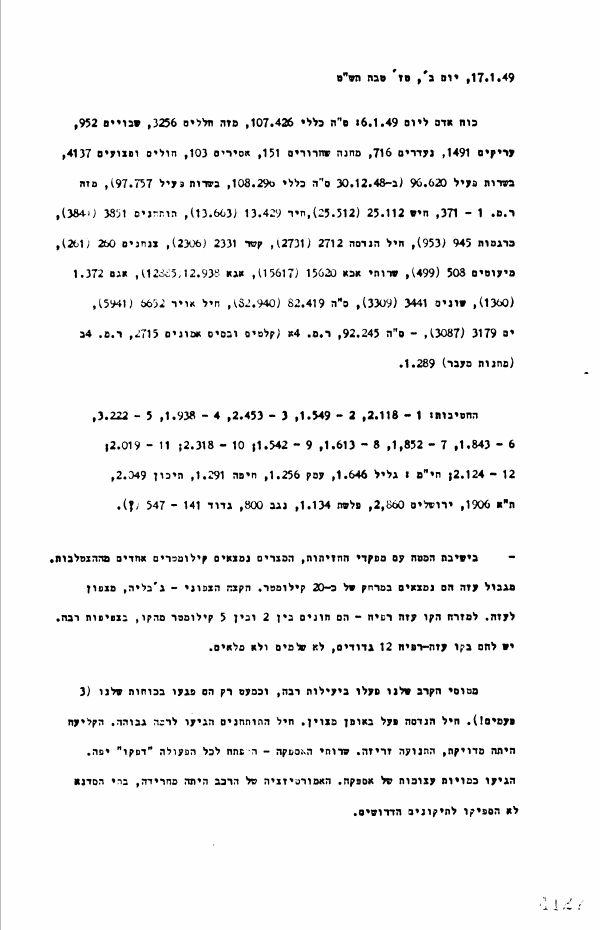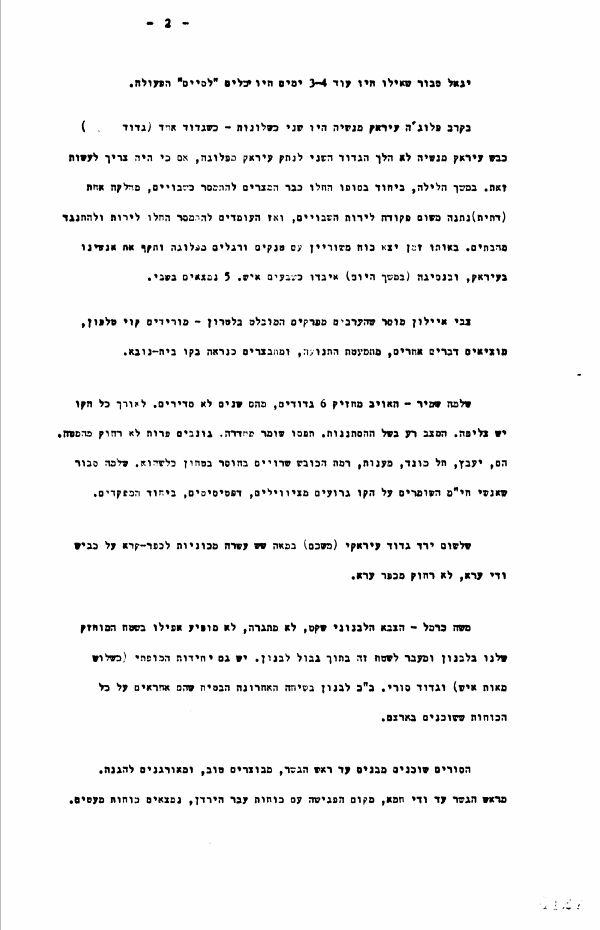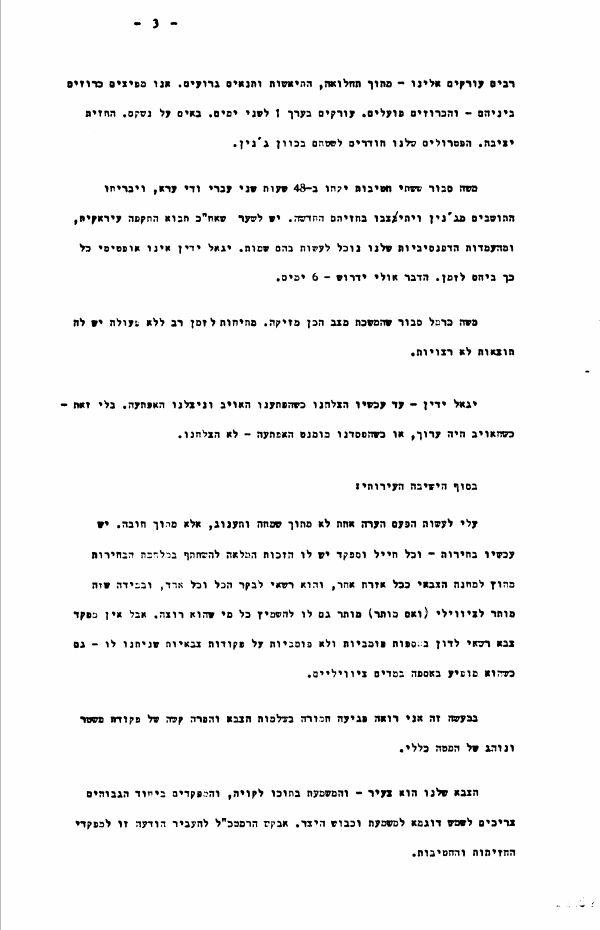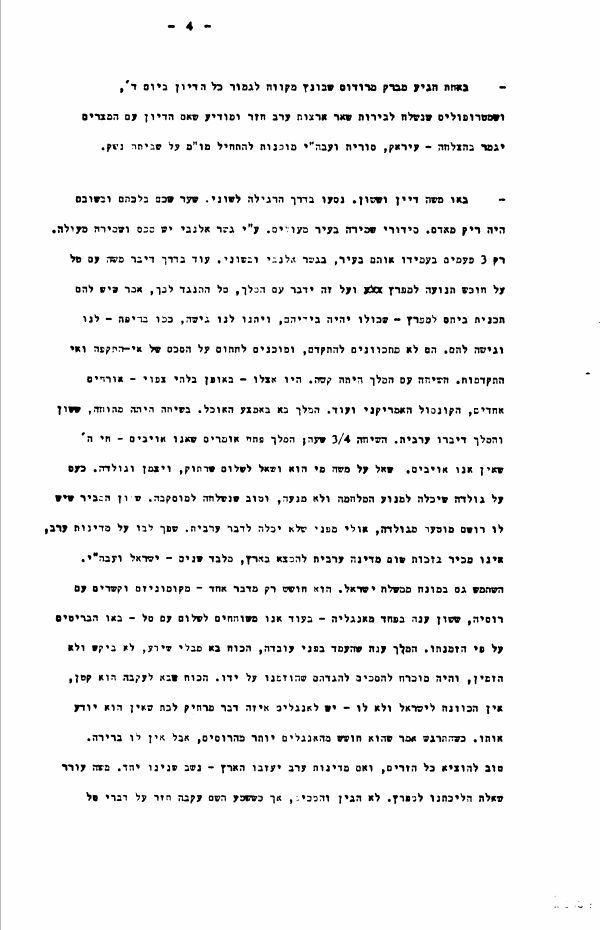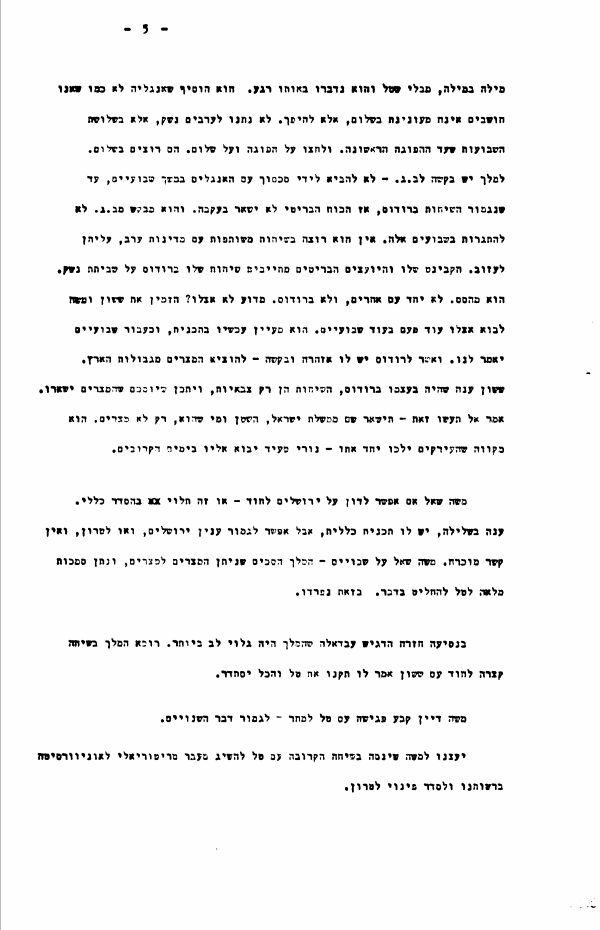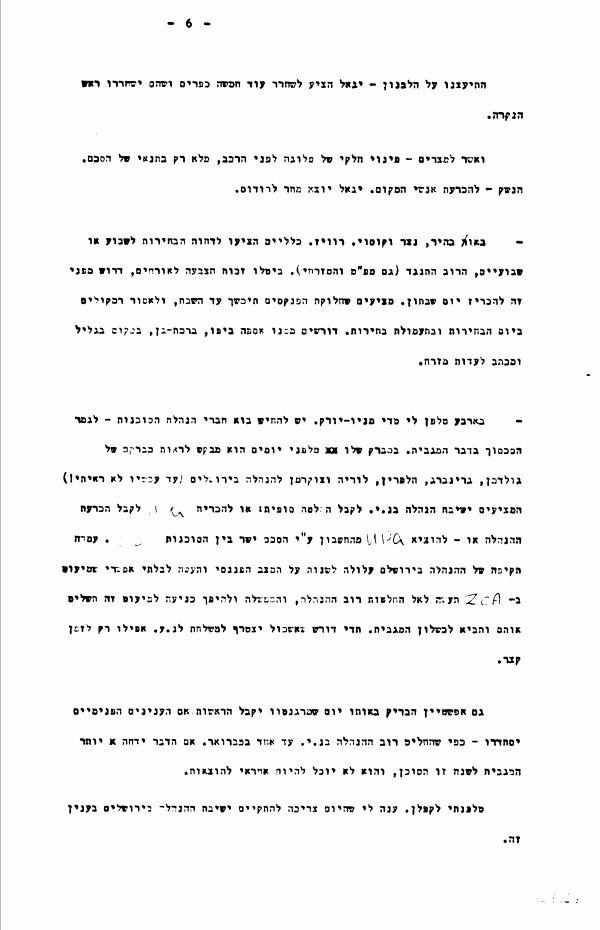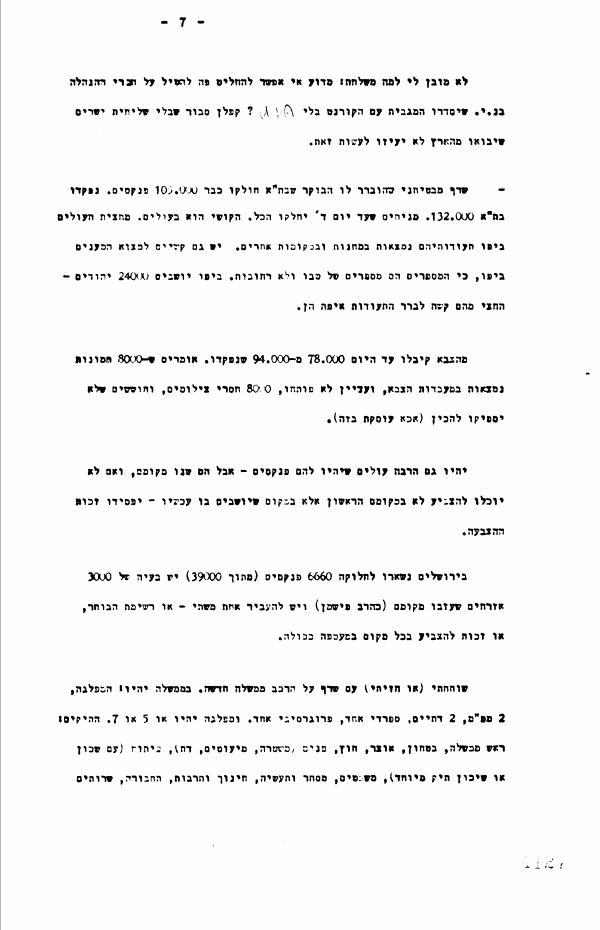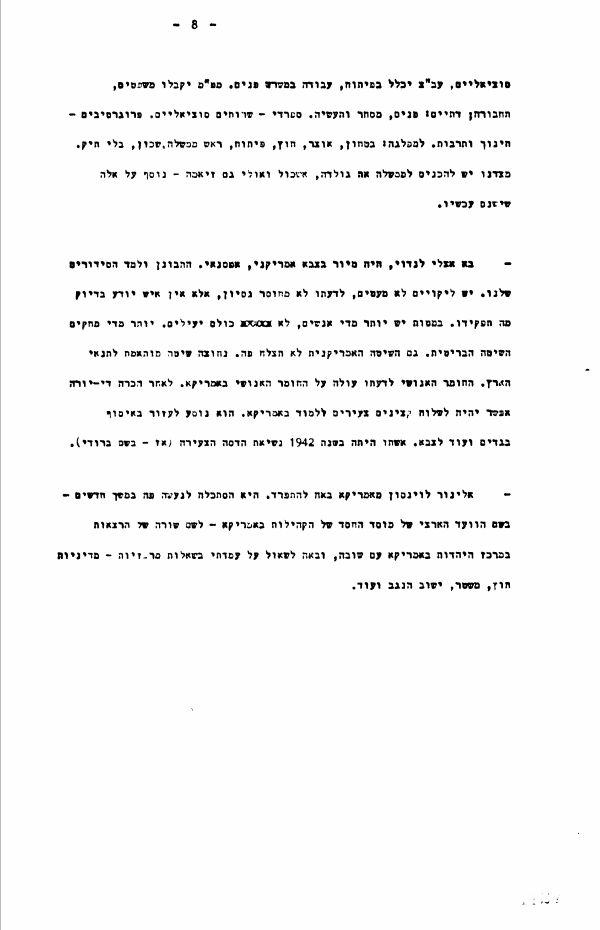Monday, January 17, 1949
Manpower as of January 6, 1949: Overall total 107,426, of whom [there are] 3,256 fallen, 952 POWs, 1,491 deserters, 716 missing, 151 discharge camp, 103 prisoners, 4,137 ill and wounded, 96,620 in active service (on December 30, 1948, overall total 108,296, in active service 97,757), of whom R.M. 1 [reshima mekubetzet? i.e., collective list, a military unit without a manpower standard (quota) that comprises soldiers temporarily not being counted in other units as part of those units' standard] - 371, Hayish [Field Corps] 25,112 (25,512), infantry 13,429 (13,663), artillery corps 3,851 (3,844), mortars 945 (953), engineering corps 2,712 (2,731), signal 2,331 (2,306), paratroopers 260 (261), Minorities 508 (499), Personnel Department services 15,620 (15,617), Logistics Department 12,938 (12,885), Operations Department 1,372 (1,360), miscellaneous 3,441 (3,309), total 82,419 (82,940), Air Force 6,652 (5,941), Navy 3,179 (3,087) - total 92,245, R.M. [collective list?] 4A (intake [facilities] and training camps) 2,715, R.M. [collective list?] 4B (transit camps) 1,289.
The brigades: 1 - 2,118, 2 - 1,549, 3 - 2,453, 4 - 1,938, 5 - 3,222, 6 - 1,843, 7 - 1,852, 8 - 1,613, 9 - 1,542; 10 - 2,318; 11 - 2,019; 12 - 2,124; garrison: Galilee 1,646, Valley 1,256, Haifa 1,291, Tichon [Central] 2,049, Tel Aviv 1,906, Jerusalem 2,860, Philistia [the southern coastal region] 1,134, Negev 800, Battalion 141 - 547 (?).
- [General] Staff meeting with front commanders [the following details were evidently provided by Yigal Allon:] The Egyptians are positioned a few kilometers from the crossroads [in Rafiah]. They're 20 km from the ''Auja border. The northern end - Jabalia, north of Gaza, east of the Gaza - Rafiah line. They're stationed between 2 and 5 km from the line, very densely. Along the Gaza - Rafiah line they have 12 battalions, neither complete nor full.
Our fighter planes were very effective in action, and they were almost the only ones that struck our forces (3 times!). The Engineering Corps operated excellently. The Artillery Corps reached a very high standard. Targets were struck accurately, movement was rapid.
The logistical services - the key to the entire operation - functioned well. Huge amounts of supplies arrived. The amortization [deterioration] of vehicles was horrendous; workshops couldn't keep up with the required repairs.
Yigal [Allon] thinks that if they'd had 3-4 more days, they could have "finished" the operation.
In the Faluja - Iraq-Manshiyya battle there were two failings. When one battalion captured Iraq-Manshiyya, the other battalion didn't go to sever Iraq[-Manshiyya] from Faluja, although it should have. During the night, especially at the end, the Egyptians had already begun to surrender as POWs, [and] one platoon (religious) for some reason gave an order to shoot the POWs, and then those who were about to surrender began shooting and resisting from the houses. At the same time an armored force with tanks and infantry came out of Faluja and attacked our men in Iraq[-Manshiyya], and during the retreat (over the course of the day) we lost about 70 men. 5 are in captivity.
[Center (Merkaz) Front Commander] Zvi Ayalon reports that the Arabs are dismantling the enclave in Latrun - taking down telephone lines, removing other things, activity is declining, and apparently they're fortifying themselves along the Beit Nuba line.
[Eastern Front Commander] Shlomo Shamir - the enemy [Iraq] maintains 6 battalions, two of which are irregular. There's sniper fire all along the line. The situation is bad because of infiltration. A guard from Hadera was captured. They're stealing fruit not far from the headquarters. [Kefar] Hess, [Kefar] Yavetz, Tel Mond, Ma'anit, [and] Ramat HaKovesh are in a state of some insecurity. Shlomo thinks that the garrison men guarding the line are worse than civilians. Defeatists, especially the commanders.
Two days ago an Iraqi battalion came down (from Nablus) in 116 cars, to Kafr Qara on the Wadi ''Ara road, not far from Kafr ''Ara.
[Northern Front Commander] Moshe Carmel - the Lebanese army is quiet, not inciting, not even making an appearance in territory held by us in Lebanon or beyond this territory within the Lebanese border. There are also units of the mufti's (about 300 men) and a Syrian battalion. During the last talks the Lebanese representative promised that they're responsible for all the forces stationed in their country.
The Syrians are stationed from the Banias to the bridgehead [of Mishmar HaYarden], well-fortified, and organized for defense. From the bridgehead to Wadi Hama [Hamat Gader], where they encounter the Transjordanian forces, there are few forces. Many are deserting to our side - out of illness, despair, and terrible conditions. We're distributing flyers among them - and the flyers are working. They're deserting [at a rate of] about one every two days. They come with their weapons. The front is stable. Our patrols are making incursions into the [Iraqis'] territory in the direction of Jenin.
Moshe Carmel thinks that two brigades will take both sides of Wadi ''Ara in 48 hours, and drive away the residents of Jenin and establish themselves at their new front [north of Dotan Valley]. Presumably an Iraqi attack will follow, and from our defensive positions we'll be able to demolish them. Yigael Yadin is not so optimistic about time. It might require 6 days.
Moshe Carmel thinks that maintaining a "state of readiness" is harmful. Prolonged tension without action has undesirable effects.
Yigael Yadin - so far we've succeeded whenever we surprised the enemy and exploited the surprise. Otherwise - when enemy was prepared, or when we lost the moment of surprise - we weren't successful.
At the end of the meeting I commented:
This time I must make one comment not out of joy and pleasure but out of necessity. Elections are currently taking place - and every soldier and commander has the absolute right to take part in the election war outside of the military camp like any other citizen, and he is entitled to criticize everything and everyone, and to the extent that it's permissible for the civilian (if it's permissible), then he's also permitted to denigrate whomever he wants. But a military commander is not permitted, either at public or at non-public gatherings, to discuss military orders that were given to him - even when he appears at the gathering in civilian clothing.
I view such action as a severe blow to the integrity of the army and a serious violation of the General Staff's governance and practice decree.
Our army is young - and its internal discipline is flawed, and the commanders, especially the high [senior] ones, need to serve as a model for discipline and restraint. I'll ask the chief of staff to convey this message to front and brigade commanders.
- At 1 a cable arrived from Rhodes [saying] that Bunche hopes to conclude the entire discussion on Wednesday [January 19] and that Stropolis [sp.] [of the UN staff], who was sent to the capitals of the other Arab countries, returned and reports that if the discussion with the Egyptians concludes successfully, then Iraq, Syria, and Transjordan are prepared to begin negotiations on an armistice.
- Moshe Dayan and [Eliahu] Sasson came. They traveled by the usual route to Shuni [sp.]. Damascus Gate was empty of people when they left and when they returned. The security arrangements in the city are excellent. Near Allenby Bridge there are customs and excellent security. They were only stopped 3 times: in the city, at Allenby Bridge, and in Shuni [sp.]. Even en route Moshe began speaking with [Abdallah al-]Tall about freedom of movement to the Gulf of [Eilat] and about speaking with the king about this. Tall objected to this, saying that they have a plan for the Gulf - that it would all be in their hands, and they would give us access, as in Haifa - access for them. They don't intend to advance, and are prepared to sign an agreement on not attacking and not advancing. The conversation with the king was difficult. He - unexpectedly - had a few guests, the American consul and others. The king arrived in the middle of the meal. The conversation was tense. Sasson and the king spoke in Arabic. The conversation [lasted] ¾ of an hour. The king opened: They say we are enemies - by the living God we are not enemies.
He asked about Moshe [Dayan], who he is, and asked how Shertok, Weizmann, and Golda are. He was angry at Golda, [saying that she] could have prevented the war and didn't, and it's good she was sent to Moscow. Sasson explained that he has a mistaken impression of Golda, perhaps because she couldn't speak Arabic. [The king] poured his heart out regarding the Arab states. He doesn't recognize the right of any Arab state to be in the country, aside from two - Israel and Transjordan. He also used the term ["]government of Israel["]. Just one thing worries him - communism and relations with Russia. Sasson replied that [Israel is] fearful of England: while we were discussing peace with Tall, the British came to [''Aqaba] at his invitation.
The king replied that he was confronted with a fact, the [British] force came without his knowing. He didn't request or invite it, and he had to agree and to say that they'd been invited by him. The force that came to ''Aqaba was small. It's not directed at Israel or at him - the English have something far-reaching, and he doesn't know what it is. When he became emotional, he said that he's more concerned about the English than the Russians, but he has no choice. It would be good to remove all the foreigners, and if the Arab states leave the country - we'll both settle down together. Moshe raised the question of are going to the gulf. He didn't understand and agreed, but when he heard the name ''Aqaba he repeated what Tall had said word for word, without him and Tall having spoken at that moment. He added that England, in contrast to what we think about it not being interested in peace, actually is [interested]. They didn't give the Arabs weapons except during the three weeks leading up to the first truce, and they urged a truce and peace. They want peace. The king has a request from B.G. - not to create a conflict with the English over the next two weeks, until the talks in Rhodes are concluded, then the British force won't remain in ''Aqaba, and he is requesting that B.G. not provoke [the English] during these two weeks. He doesn't want joint talks with the Arab states. They should leave. His cabinet and the British advisors are compelling him to [engage in] talks in Rhodes on an armistice. He's hesitant. Not with the others, and not in Rhodes. Why not at his [location]? He invited Sasson and Moshe to come to his place again in two weeks. He's reviewing the plan now, and in two weeks he'll tell us. And as to Rhodes he has a warning and a request - to remove the Egyptians from the borders of the country. Sasson replied that he himself had been in Rhodes, and the talks are only military, and it's possible that it will be agreed that the Egyptians remain [in Gaza]. He said: Don't do that - let the government of Israel stay there [or] the devil [or] whoever, just not Egypt. He hopes that the Iraqis will go along with him - Nuri Sa'id will arrive in the coming days.
Moshe asked whether Jerusalem can be discussed separately - or if it depends on a general agreement. He replied in the negative. He has a general plan, but it's possible to conclude the matter of Jerusalem, or Latrun, and it's not necessarily linked. Moshe asked about POWs - the king agreed that we turn the Egyptian [POWs] over to Egypt, and gave Tall complete authority to decide the matter. With that, they parted.
During the drive back Abdallah [al-Tall] emphasized that the king had been extremely candid. The king's physician [Dr. Sethi (sp.)], in a brief conversation with Sasson, told him: Buy [convince] Tall and everything will work out.
Moshe Dayan arranged a meeting with Tall for the following day - to conclude the matter of the POWs.
We advised Moshe to try, during his next conversation with Tall, to secure territorial passage to the university for us, and to arrange the evacuation of Latrun.
We consulted on Lebanon - Yigael [Yadin] suggested releasing another five villages and they'll release Rosh HaNikra.
And as to Egypt - partial evacuation of Faluja before the agreement: complete [evacuation] only on the condition of an agreement [being reached]. The weapons - to be decided by those who were there. Yigael leaves for Rhodes tomorrow.
- Bahir, Netzer, and Kossoy came. [The] Revis[ionists and] General [Zionist]s suggested postponing the election for a week or two; the majority objected (including Mapam and HaMizrachi). They canceled voting rights for visitors, which requires declaring a sabbatical day. They suggest that the distribution of [ID] cards continue until Saturday, and to prohibit loudspeakers on election day and for election propaganda. They're asking us for assemblies in Jaffa, Ramat Gan, instead of the Galilee, and a letter to Mizrahi [Eastern] communities.
- At 4 Teddy telephoned me from New York. The arrival of the [Jewish] Agency Executive members needs to be expedited - to put an end to the conflict regarding the UJA. In his cable of two days ago he asks to see the cable from Goldmann, Greenberg, Halperin, Lurie, and Zuckerman to the Executive in Jerusalem (I haven't seen it yet!) in which they suggest an Executive meeting in N.Y. to make a final decision: either to force the UPA to accept the Executive's decision or to remove the UPA from the account through a direct agreement between the Agency [and?] DC. A firm stance by the Executive in Jerusalem could have an impact on the financial situation and make it impossible for a minority in ZOA to nullify decisions of a majority in the Executive, and the government[,] and conversely submission to this minority would put them in charge and lead to the downfall of the UJA. Teddy demands that Eshkol join the delegation to N.A. [N.Y.?] even if only briefly.
Epstein also cabled on the same day that Morgenthau will accept the leadership if the internal matters are resolved - as decided by a majority of the Executive in N.Y. by February 1. If the issue is further postponed the fundraising for this year would be at risk, and he cannot take responsibility for the outcome.
I telephoned Kaplan. He told me that an Executive meeting is supposed to take place in Jerusalem today on this matter.
It's not clear to me why a delegation [is necessary]: Why can't it be decided here that the Executive members in N.Y. should sort out the UJA with the cornet [?] without the UPA? Kaplan thinks that without honest / direct [?] delegates coming from the country they won't dare to do this.
- Sherf assures me that he was informed this morning that 105,000 [ID] cards have ktalready been distributed in Tel Aviv. 132,000 were registered in Tel Aviv. They estimate that by Wednesday all will be distributed. The problem is immigrants. For half the immigrants in Jaffa, their cards are in camps and elsewhere. There are also problems finding the addresses in Jaffa, because the numbers are Tabu [land registry] numbers rather than street numbers. There are 24,000 Jews in Jaffa - for half of them it's hard to know where their cards are.
In the army 78,000 of the 94,000 who registered have received [their cards]. They say that 8,000 pictures are in army laboratories, and haven't been developed yet, 8,000 lack photographs, and are afraid they won't manage to prepare them in time (the Personnel Department is handling this).
There will also be many immigrants who have cards - but have changed their location, and if they aren't able to vote in their current location rather than their first one - then they'll forfeit their voting rights.
In Jerusalem there remain 6,660 cards to distribute (out of 39,000). There's a problem of 3,000 citizens who moved (such as Rabbi Fishman) and one of two things has to be shifted - either the voter list or the right to vote anywhere in a double envelope.
I spoke (or fantasized) with Sherf about the composition of a new government. The government will comprise: the party, 2 Mapam, 2 Religious, one Sephardi, one Progressive. And the party will have 5 or 7. The portfolios: Prime Minister, Defense, Finance, Foreign [Affairs], Interior (Police, Minorities, Religious [Affairs]), Development (with housing, or housing as a special portfolio), Justice, Trade and Industry, Education and Culture, Transport, Social Services, PW [Public Works] will be included within Development, Labor within the Ministry of the Interior. Mapam will receive Justice, Transport; Religious: Interior, Trade and Industry. Sephardi[m] - Social Services. Progressives - Education and Culture. For the party: Defense, Finance, Foreign [Affairs], Development, Prime Minister, Housing, without portfolio. As far as we're concerned, Golda, Eshkol, and maybe also Ziama should be brought into the government - in addition to those who are part of it now.
- Landau came to see me, was a major in the American army, a quartermaster. He observed and studied our arrangements. There are more than a few shortcomings, not for lack of experience in his view, but because no one knows his precise role. There are too many people in the staffs, not all of them efficient. [We] imitate the British system too much. The American system won't work here either. [We] need a system that's adapted to the conditions of the country. In his view the human material surpasses the human material in America. After de jure recognition it will be possible to send young officers to learn in America. He's leaving in order to help with the collection of clothes and other things for the army. In 1942 his wife was president of Young Hadassah (named Brody at the time).
- Eleanor Levinson from America came to say goodbye. She has observed what was happening here over the course of months - on behalf of the national committee of the [Jewish] communities' charity institution in America - for a series of lectures at the Jewish center[s?] in America upon her return, and she came to ask about my position on key questions - foreign policy, governance, settlement of the Negev, and so on.





